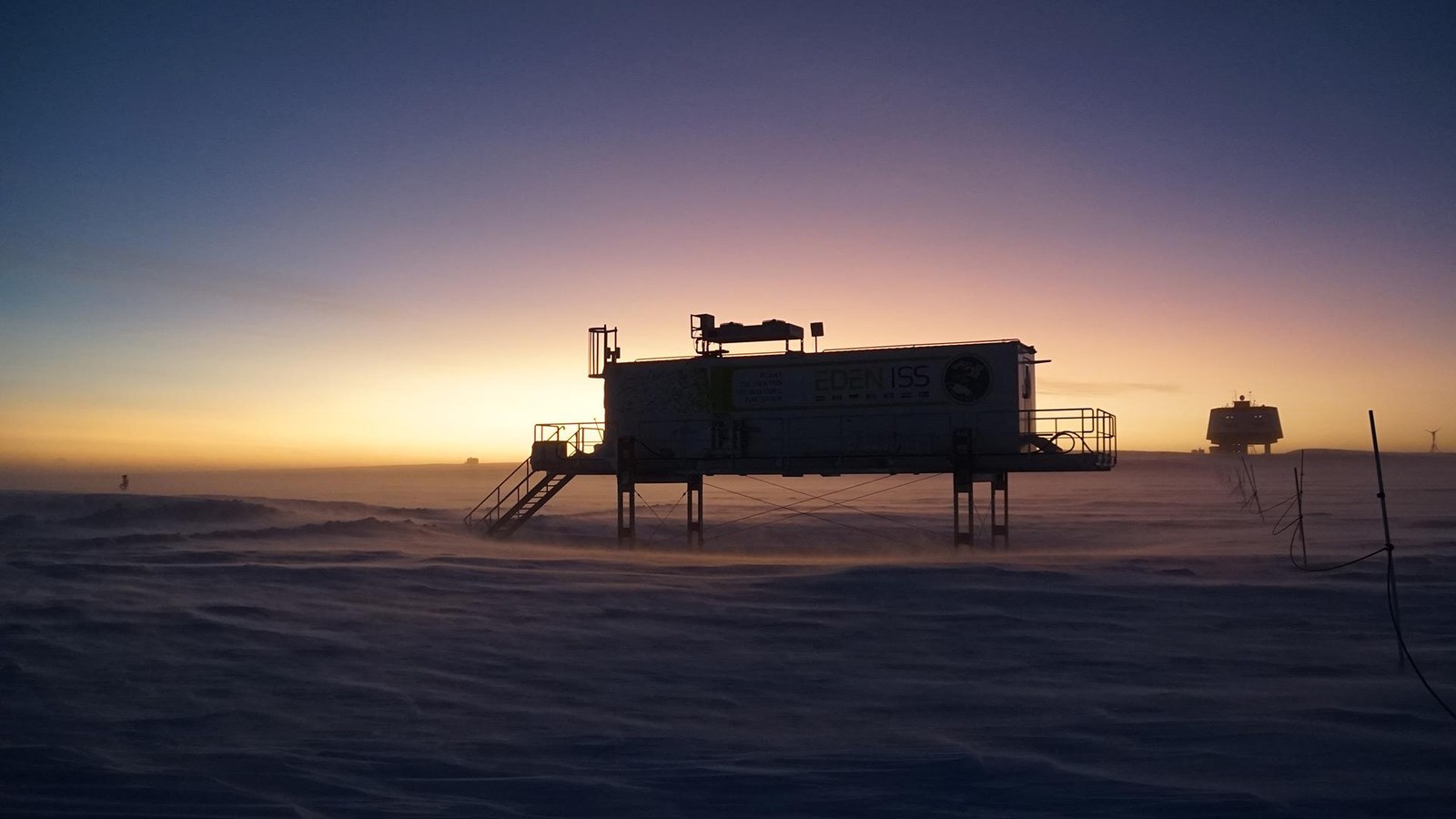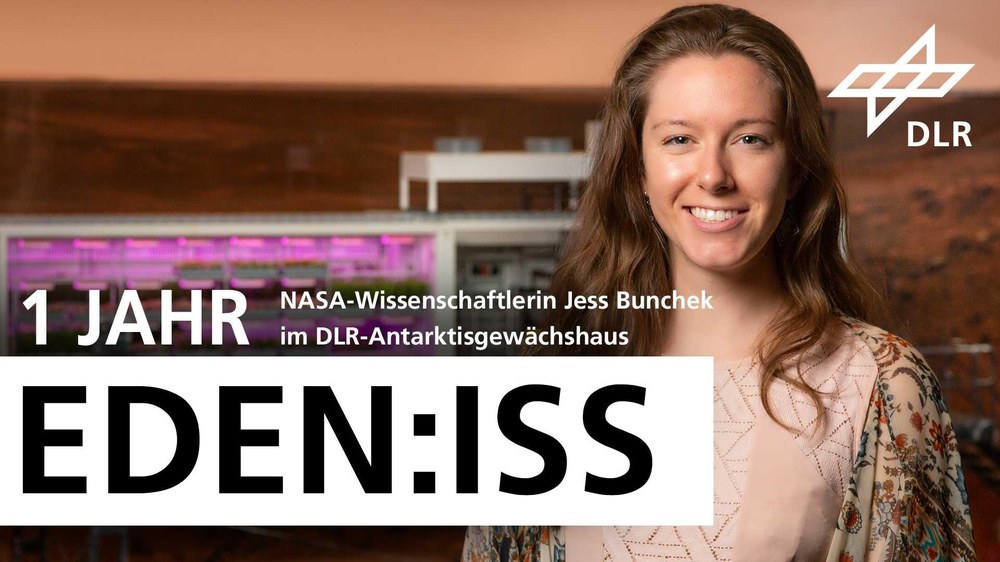O-Ton #1: Jess Bunchek
How do you prepare for this Antarctic overwinter mission?


Folke Mehrtens/Alfred-Wegener-Institut
The EDEN ISS greenhouse, developed by the German Aerospace Center (Deutsches Zentrum für Luft- und Raumfahrt; DLR), has been in Antarctica since 2018. It was created to conduct research into food production in deserts and cold regions, as well as exploring the possibility of growing fresh food in the hostile conditions on the Moon or Mars. Plant scientist Jess Bunchek of NASA's Kennedy Space Center will spend a year on the perpetual ice as a DLR guest researcher during the winter of 2021, during which time she will grow vegetables without soil and under artificial light. She will be part of the overwintering crew at the Neumayer III Antarctic Station, which is operated by the Alfred Wegener Institute (AWI). After months of training, the crew will set sail on 20 December 2020, on board the AWI research vessel Polarstern, embarking on a one-month non-stop voyage across the Atlantic. They are scheduled to reach Antarctica in late January. Prior to that, the crew will be quarantined to rule out any COVID-19 infections on board.
"EDEN ISS is a unique project. There are few other facilities like it in the world," says Bunchek, who is currently working at the DLR Institute of Space Systems. "The extreme climate and overwintering aspect make it all the more unique. This collaboration between DLR and NASA is intended to help inform the design of a future greenhouse on the Moon or Mars and determine what is needed to support astronaut crews."

NASA guest scientist set to spend a year at DLR's EDEN ISS Antarctic
Your consent to the storage of data ('cookies') is required for the playback of this video on Youtube.com. You can view and change your current data storage settings at any time under privacy.
©DLR/NASA
At the DLR Institute of Space Systems in Bremen, Bunchek learned how to operate the Antarctic greenhouse during the polar night, via a digital connection with the control centre at the Institute. System data and plant growth are digitally monitored from there, and it is also possible to operate the greenhouse remotely for a few days in the event of Antarctic storms. "With Jess Bunchek on site and the collaboration with NASA, we now have a unique opportunity to advance our research in the EDEN ISS greenhouse and to take things to a new level. This ambitious research programme is an important milestone for the creation of a greenhouse module inside an international lunar station, with a view to crewed missions to Mars," says EDEN ISS Project Manager Daniel Schubert. As part of the joint project, some lettuces and varieties of vegetables have already been harvested in the Antarctic, and NASA has tested them for space suitability on the International Space Station (ISS).
Bunchek has also conducted extensive preparations for the extreme conditions in Antarctica with the new ten-member overwintering crew, including completing a glacier course in the Alps and undergoing fire protection training. "Preparation is everything," stresses Bunchek. "I think our period of preparation makes the Neumayer III Station particularly interesting. It has long been compared to other stations, partly because AWI wants to ensure that the overwintering team has the right balance of people. And then there is also the fact that we are going to be isolated for the whole winter, so we have to be prepared for any situation."
Neumayer III Station operated by AWI, will be supplied exclusively by sea this year. The research vessel Polarstern will bring material and fuel to the Antarctic as usual. However, due to the COVID-19 pandemic, all people working at the station will also travel by ship this season. Polarstern is scheduled to dock in Atka Bay on approximately 20 January 2021. Then the 25 people travelling on board the ship can disembark and start working at Neumayer III Station: AWI scientists will maintain the observatories for air chemistry, geophysics and meteorology and exchange information on long-term measurements with the old and new overwintering crews. Technicians ensure that the station infrastructure remains functional.
Global food production is one of the key challenges facing societies in the 21st century. An ever-increasing world population and ongoing upheavals due to climate change mean that there is a need for new solutions for cultivating plants, even in regions with an unfavourable climate. In deserts and locations with low temperatures, closed greenhouses allow produce to be harvested regardless of sunlight and the time of year, as well as using less water and eliminating the need for pesticides and insecticides. The EDEN ISS project is subjecting a futuristic model greenhouse of this kind to long-term testing in extreme Antarctic conditions. In the first extensive overwinter research campaign, the greenhouse produced a total of 268 kilograms of food in an area of just 12.5 square metres over the course of nine and a half months. This included 67 kilograms of cucumbers, 117 kilograms of lettuce and 50 kilograms of tomatoes. An initial greenhouse concept for future space missions has been developed using the results of this research.
For more information, read the full interview with Jess Bunchek, where she talks about her home country – the USA, her preparations in Germany during the COVID-19 pandemic, Christmas celebrations at sea and her upcoming adventure on the planet's iciest continent.
